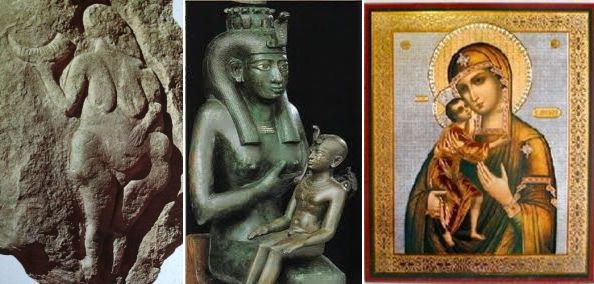
| Home DH-Debate |
| 1. Introduction | 2. Emerging in Europa |
| 3. Men's Psychology | 4. Emerging of Feminism |
| 5. Literature |
In China, I have often heard the remark that Western men are too interested in women. They do not think it is quite natural that men have such a strong fascination with women.
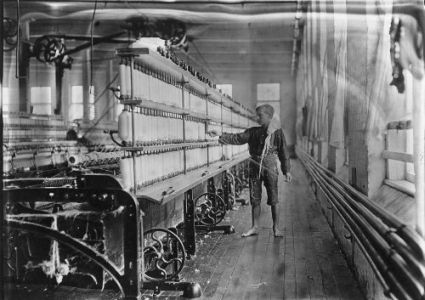
"Mule spinning room" in Chace Cotton Mill in Bulington England. Photo Wikipedia.
Men crave to accomplish achievements - basically and unconsciously to appear worthy to win the love of women. But I think that western men crave more than others, and this has been the basic reason why the industrial revolution first emerged in Europe.
Usually, one speaks of three groups of factors as possible causes why the industrial revolution first emerged in Europe and not, for example, in China, Japan or India. However, inspired by Freud and Professor Schwarz, I will suggest that Western men's big unconscious need to perform achievements - in order to win the love of women - was and is the real deep psychological drive in the European technical and economic development.
Traditionally three groups of factors are identified as possible causes of that the industrial revolution first broke through in Europe. Historian Niall Ferguson has proposed a fourth cause.
Geography:
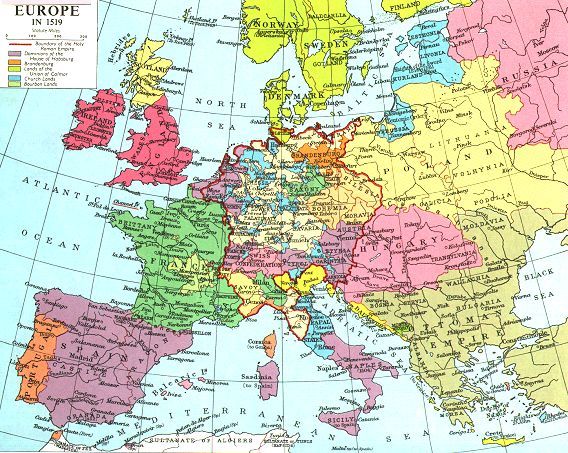
Map of Europe in 1519. Europe has always been a patchwork of republics,
kingdoms and principalities.
Rivers, impassable swamps and mountain ranges created natural conditions for that Europe remained a continent divided into many nations and principalities. Thus a single king or prince could not stop technological progress by banning it, such as book printing, guns or new types of ship, because there was always at least one neighboring principality that would allow it.
Especially earlier it was suggested that in the northern countries, which most of Europe belongs to, winter is very long, and this fostered a tradition of
planning.
In England coal and iron ore deposits were available geographically close to each other, allowing iron production based on coke without major transport costs.
Culture:

Martin Luther states his 95 theses on the church door in Wittenberg on October 31. 1517, and thereby start the Protestant Reformation in Europe.
The Protestant work ethic (Weber) comes from that God is almighty, his ways are incomprehensible, and he saves the souls that he wants to save. Men cannot set up rules for God's decisions by stating that those, who do such and such deeds, which are labeled good, will be saved.
The individual can therefore never know if his soul will be saved or not, as everything is in the hands of God, and His will knows no mortal. Protestant can only work hard and systematic in their lives here on Earth, and perceive the fruits of work as a proof of God's grace. Thus, if they have a good profit, it is an indication that God looks graciously upon them, and this can give them hope for salvation - but not certainty. Because they never feel quite sure of their soul's salvation, this is a constant motivation to be industrious.
Other world regions and religions tell us that God is always present in this World and nothing happens without his decisions (islam), everything is thus a chain of unpredictable miracles; or that the world is veiled in mystery (Buddha) which cannot be understood rationally. However Europe's Judeo-Christian culture tells that God created the world with its eternal laws of nature, he then went off to a distant galaxy, leaving it all to humans, like a well-prepared clockwork; Therefore, it makes sense to explore these eternal laws of nature and ourselves take care of our life here on Earth.
Institutions:

The English Civil war - Cromwell leads the attack in the Battle of Marston Moor 2. July 1644. - Drawing by John Crew.
Other things being equal, countries with high work ethic achieve greater prosperity. Already in the Middle Ages emerged the monastic order the Cistercienses, whose monks were known to be very industrious and thrifty, which is exactly the virtues that Weber attributed to Protestantism. Weber highlighted the Cistercienses as early forerunners of the Protestant ethic.
After the English Civil War feudalism was replaced by economic liberalism, and a multitude of small markets gave way to a huge market, which meant that it became profitable to exploit technical innovations.
Some believe that patent systems, ie the allocation of fixed-termed monopolies to inventors in the context of a patent law, have been crucial to the economic development in Europe.
Competition:

Adam Smith 1723 - 1790. Many believe that the economic liberalism, as introduced by Adam Smith, was the reason why the industrial revolution emerged precisely in Europe.
Niall Ferguson believes that competition was the reason why the Industrial Revolution emerged on the European continent. It may be right, but not an accurate statement. For who competed and why? Was it nations, companies or individuals, who competed with each other? He may argue that the entire Western culture was steeped in competition.
But if primarily the nations were competing with each other, so it will require unity and cooperation within nations, that is, the opposite of competition. If the technical progress primarily was driven by companies that competed with each other, then it will assume the opposite, namely, cooperation and sense of community within companies.
Moreover, if the individual competition was the reason for the industrial
revolution to emerge in Europe, then it will just open up a new question: What was the reason why European men competed more than others?
The Industrial Revolution was created by rivaling white men, who were motivated by their longing for women's love.
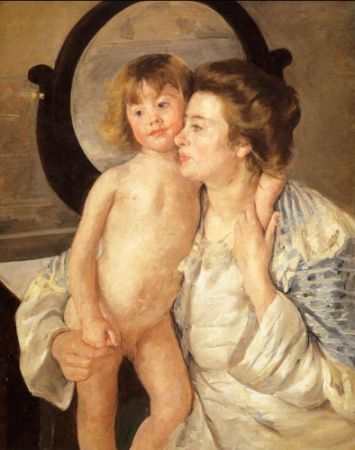
Mother with child - painted by an unknown artist.
From birth, the newborn child emotionally is part of the mother, what it also was biologically. The mother is almighty in fulfilling the child's wishes. The child only needs to want food, and then comes a big lovely breast full of the sweetest milk. You could say that the child in this stage sees itself as the center in a warm and loving world that is structured exclusively to serve its needs. Freud named this unity of mother and child "the primary narcissism".
But, sadly, life in paradise will not last forever. There is a real world "out there", which is not the mother, and that is quite indifferent to a random child. This emerging realization makes the child feel vulnerable and defenseless and makes it even more dependent on the mother. To soothe its anxiety at the meeting with the heartless reality the child builds an idealized image of an almighty mother that Freud (and Jung) calls "maternal imago" representing a longing to return to the original narcissistic fusion with this idealized mother.
Freud calls this unconscious longing for an escape from the cruel reality for "ego-ideal". In the unconscious mind "ego ideal" becomes a kind hedonistic drive that competes with "super-ego" to attract the "Ego's" attention. Super-ego wants us to follow the father's commands, do our duty and act morally right, while the ego-ideal tempts us to indulge in hedonistic pleasures, as the child once saw itself as the center of the world when it got food and love from the almighty mother.
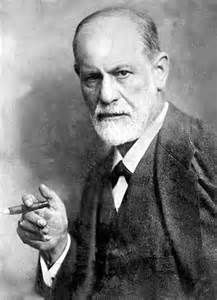
Sigmund Freud 1856-1939.
However, boys and girls are different. Throughout his life, Freud was convinced that women unconsciously are jealous of men because they have a penis.
When the boy becomes about six years, he will begin to perceive the father as a rival and have fantasies of destroying him to get the mother to himself. But after some time he comes to the realization that he has no chance against the adult male. The boy believes that the father has something that the mother wants, and this is the reason why the almighty mother allows this man in her vicinity. Therefore, the boy unconsciously becomes convinced that by growing up to be like the father, he will be able to fusion with someone, who looks like the mother and thus the "maternal imago".
The boy makes his father's rules to part of his own subconscious mind; he learns to punish himself in the same way he predicts that his father would have punished him. In this way the part of the subconscious mind that Freud calls the "super-ego" is created; that is our unconscious moral guardian.

|
Left: Venus from Laussel is found under a rock overhang in France at Laussel in Dordogne not far from Lascaux. The place is believed to have been a place of worship of a mother goddess. It origins from the Ice Age.
Mid: The mother goddess Isis with the Horus child. Bronze statue from the Egyptian Karnak period - 664-332 BC - exhibited in the Egyptian Museum in Cairo.
Right: Virgin Mary, Mother of God. This very old Russian Feodorovskaya icon
was very important for the Romanov family. It can be traced back to the apostle
Lucas.
Thus psychology of men is created according to Freud. It is our fate and whole motivation to strive to fusion with "maternal imago" and feel the blessing of her warm presence. As Mick Jagger said, "Why do you think that we work so hard to write songs, practice and travel around the world and give concerts?

Women hold the key to man's happiness in the palm of their hands.
The ideal almighty mother, represented by the woman, thus keeps the keys to man's happiness in the palm of her hand. But it also gives her a scary and frightening power. For she is just a woman, and women have their unpredictable caprices and whims, she can give him the love that he desires so intensely, or she can simply declare that she does not love him.
The mother is the object of men's desires, but the closer the fusion a man attains with the woman, the more defenseless he becomes against her wishes and whims and the less he can stand being rejected and abandoned. The more he makes progress against the infantile relationship with the mother, the weaker he becomes, and the stronger she becomes.
Men want to appear worthy of women's love. They have a basic need to accomplish something that can give them recognition, inventing new methods, perform great feats, become rich and famous or other achievements and Western men have that need more than men from other cultures, that was the reason why the industrial revolution broke through in the West.
A man feels a deep uncertainty about whether his life's project - that is to win the love of women - will succeed or not because women are unpredictable and unforeseeable. Such a deep and fundamental fear cannot be recognized consciously, and therefore it shows itself as an unexplained quest toward achieving something, to create something or otherwise make a difference, a restlessness and curiosity that only can be explained with reference to the unconscious mind, to which it is displaced.

|
The modern industrial society has been created by men.
It is this compulsive side of men's work, which has resulted that technical inventions and cultural creations largely have been a male activity throughout the Western civilization's history.

The purpose of Western men's achievements is to make themselves worthy of the love of women.
Such unconscious compulsive quest for achievements is generally not present in women. They often feel that they rest in themselves, that they are desirable simply because they are women, and therefore they have no need for such a restless search and pursuit.
The purpose of the Western man's achievements and work is to make himself worthy to be loved by women. But the realization of the strength of this need creates in him a great fear of failing. As he realizes that success is ultimately important to him, while woman's favor is unpredictable and unforeseeable, he is gripped by fear that he will not succeed. One can call it a kind of exam nervousness.
Men are rivaling by nature - and therefore basically lonesome. Friendship and fellowship with other men in pursuit and work can soothe the loneliness, but not in the same ultimate way as a woman's love can do. A man feels a deep uncertainty about whether his life's project will succeed or not; therefore he measures himself against other men.

Achievement-oriented, controlling, compulsive, displaced, competitive, rule�bound, unemotional, logical, rational, hierarchical; these are the characteristics of work done based on the psychology of Western men.
A characteristic side of men's work is the dependence of rules and a certain mutual impersonality. Communication in connection with men's work activity is controlled by rules rather than by emotions. The reason for this is that men simply do not have so many feelings for each other. Their feelings are elsewhere, they are with the women. Women can love each other, while men respect each other.
Asians wonder also that adult western men often like sweets, such as chocolate, cola and sweet desserts. European men remember - though not consciously - that mother's milk is sweet.
That is the tension between the two genders, which has been the driving force in the development of Western civilization, and which is the real explanation for, why the industrial revolution first emerged in Europe and not elsewhere.
Feminism is a social-constructionist political ideology, which claims that the two sexes are exactly alike and identical except for some unimportant biological details. Their goal is to structure society after this alleged similarity. Doing so will feminists remove the tension between men and women and in-between men that has hitherto been and is the driving force in the development of the western civilization. It is the deadliest threat to the Western culture until now has faced.
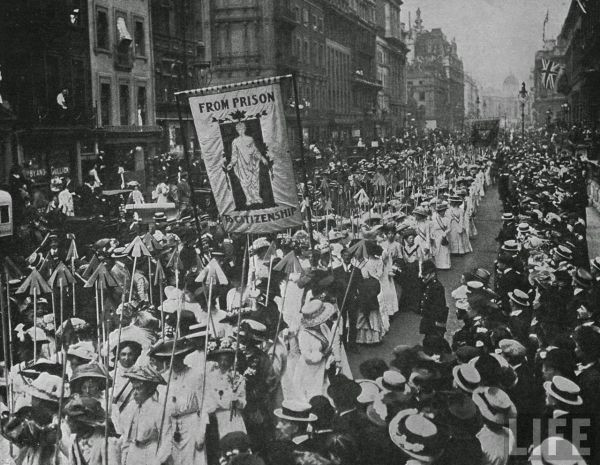
|
Suffragette demonstration in 1910.
Feminism came into the world in the West for the same reason as the industrial
revolution started there, that Western men loved their women - so to say - too much.
Tendencies of feminism have undoubtedly existed throughout the long history of humans. When the Cro Magnon hunters of the Ice Ages came back to the cave with prey, they were certainly applauded by the whole tribe. However, some women felt a pang of envy, they dreamed of pushing the men aside and themselves hunt for mammoths and woolly rhinos and receive the tribe's tribute.
It is easy to imagine that the old legends about Amazons reflected women's dreams about pushing men to the side and become fierce warriors themselves.
Sigmund Freud insisted throughout his life that women are jealous of men because men have a penis. This means that they deep in their subconscious mind envy men the typical male characteristics such as physical strength, some insensitive determination and analytical abilities.
Undoubtedly there have been tendencies to feminism in other civilizations in Asia, Africa and the Middle East, but there the men did not love their women so much as western men did, and therefore they have just given the rebellious women a good beating and tossed them onto the bed, where they belonged following their tradition.
But Western men have been paralyzed and unable to respond decisively against feminism because they love their women too much and are used to give them what they want.
|
Masculinity and the meaning of work: A response to Manichean Feminism af Howard S. Schwartz School of Business Administration Oakland University |
| To top |